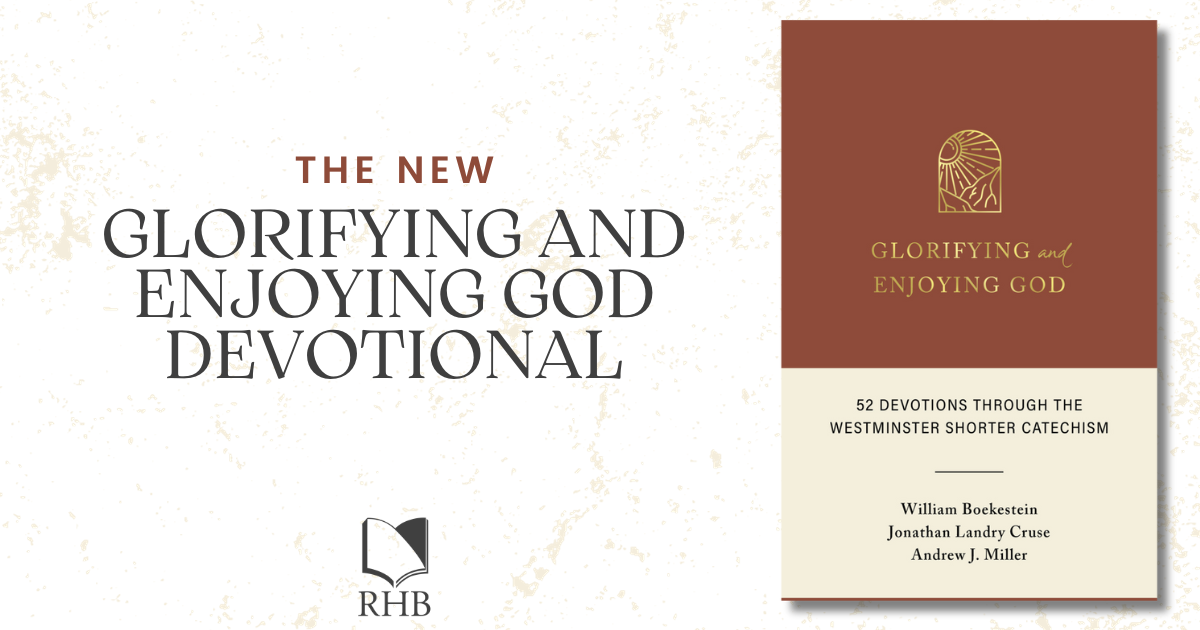This week, the blog is sponsored by Reformation Heritage Books’ new devotional on the Westminster Shorter Catechism, Glorifying and Enjoying God (written by William Boekestein, Jonathan L. Cruse, and Andrew J. Miller). Enjoy this brief article explaining the history and benefits of studying this precious document.
Glorifying and Enjoying God is intended not only to increase knowledge but to stoke love for God. We believe that the heart and mind are intertwined; that we will love God more the better we know Him. Thus, as pastors, we chose to explain the Westminster Shorter Catechism and its biblical underpinnings not only that you might understand the truth better but that the truth would set you free (John 8:32). Better theology, better knowledge of God, leads to deeper discipleship and richer doxology.
What Is a Catechism?
A catechism provides written instruction in the basic doctrines of the Christian faith. It should be based on Scripture, even a kind of paraphrase of Scripture’s content. Catechisms have been called maps that survey the ground of Scripture and help a person to navigate the Bible. It can and should be read alongside the Bible, which itself uses the question-and-answer format so often employed in catechisms: “Who is this King of glory? The LORD of hosts, He is the King of glory” (Ps. 24:10; 119:9; see also Amos 3:3–6). Clearly, while law schools today may utilize the Socratic method of teaching by asking and answering questions, the origin of this method is far more ancient.
Why Should We Use Catechisms?
Learning the Christian faith via catechism pays great spiritual dividends. Not only was Timothy taught the faith in his family (2 Tim. 1:5), but Apollos was a catechism success story:
Now a certain Jew named Apollos, born at Alexandria, an eloquent man and mighty in the Scriptures, came to Ephesus. This man had been instructed [katecheo] in the way of the Lord; and being fervent in spirit, he spoke and taught accurately the things of the Lord…. He greatly helped those who had believed through grace; for he vigorously refuted the Jews publicly, showing from the Scriptures that Jesus is the Christ. (Acts 18:24–28)
Despite our antihistorical, individualistic modern society that echoes the Athenians’ continual thirst for something new, this catechism, though hundreds of years old, continues to remain relevant and helpful because it reflects God’s Word, which is still living and active (Acts 17:21; Heb. 4:12). It reflects the pattern of sound words passed down for our edification (Acts 17:11; Gal. 1:11; 2 Thess. 2:15; 2 Tim. 1:13; Jude 1:3). The Shorter Catechism questions also foster new love: “The people of God show their love as they confess the doctrines of the Bible and as those truths inform their conduct, all to the glory and love of God,” writes J. V. Fesko. To this end, this book provides devotional theology; the catechism’s objective statements of the truth are paired to practical and doxological explanations.
B. Warfield reported that when a child explained “What is prayer” to Dwight L. Moody using the Shorter Catechism, he declared, “Thank God for that Catechism!” We pray that you, dear reader, would be able to echo that exclamation.
Pick up Glorifying and Enjoying God to instruct your family and inform your faith!










